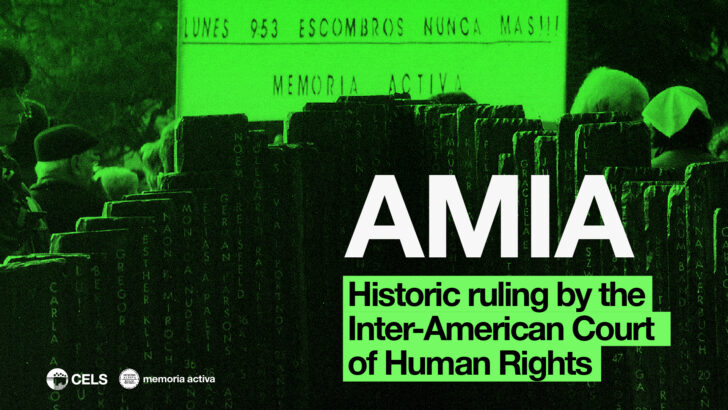Just weeks before the 30th anniversary of the AMIA Jewish community center bombing, the Inter-American Court of Human Rights condemned the Argentine State for denying historical truth and justice to the victims and society at large. The Court also mandated structural reforms regarding the use of intelligence information in judicial proceedings and access to documentation.
“After nearly thirty years, the truth of what happened remains unknown, with no accountability for those responsible for the attack or its cover-up. It has been the state’s own actions that prevented victims and their families from discovering the truth through the criminal investigation and legal processes,” stated the Court in its ruling.
The Court held Argentina responsible for all violations alleged by Memoria Activa: the violation of the right to life due to its failure to prevent the attack, inadequate investigation of both the attack and cover-up, violations of the right to historical truth and information, and complicity in the cover-up.
Key measures included the Court’s order for Argentina to promptly remove all obstacles to investigating the bombing and its cover-up within a reasonable period.
Structural reforms mandated include regulatory changes governing the incorporation and use of intelligence information as evidence in legal cases. “State authorities cannot shield behind mechanisms such as state secrecy or information confidentiality, or reasons of public interest or national security, to withhold information required by judicial or administrative authorities involved in ongoing investigations or pending processes,” it affirmed.
The Court also ordered the regulation of the declassification process and that victims be guaranteed access to the already declassified information, which should be stored appropriately for public consultation.
Additionally, the Court mandated the establishment of a public historical archive on the bombing, its cover-up, and the role of victim associations.
The Inter-American Court’s condemnation represents a milestone in Memoria Activa’s ongoing fight for justice, beginning in the aftermath of the bombing when Carlos Menem’s government, the judiciary, intelligence services, and sectors of the Jewish community opted to cover up and divert the investigation. Sisters, parents, spouses, nieces and nephews, children, and friends took to the streets seeking answers, unaware of the challenges—and interests—they would come up against.
Two months ago, the Federal Chamber of Criminal Cassation in Argentina confirmed that the cover-up of the bombing was not mere happenstance but a deliberate maneuver orchestrated and executed at the highest levels of political power. Despite this resolution, it imposed disproportionately lenient sentences that failed to match the severity of the crime. Judicial officials entrusted with investigating one of the most heinous crimes committed against Argentine society in the last forty years concocted a false narrative and paid bribes to perpetuate it, yet received sentences lighter than those for car theft. The decision to overturn this scandalous ruling will soon be in the hands of the Supreme Court of Justice.
Intelligence services deeply entrenched within Argentina’s political system played a decisive role in perpetuating impunity. From the immediate aftermath of the explosion and throughout numerous interventions over subsequent decades, political operatives and intelligence agents controlled the case. Shielded by secrecy and the discretionary use of public funds, they protected that remain obscure to date. This pattern extends beyond the AMIA case, often using “national security reasons” as a pretext for secrecy—a facade shielding the system itself, rather than serving others.
Thirty years after the morning of July 18, 1994, there has been no justice in Argentina. The perpetrators and motives behind the attack remain unknown. Archives revealing cover-up maneuvers and corruption remain secrets to Argentine society. No one rests in peace.
Today, Friday, June 14, 2024, an international tribunal affirmed that the Argentine State violated the human rights of victims and their families, as well as the collective right to truth, obligating it to engage in the ongoing investigations and implement measures of reparation. The ruling marks the culmination of a 25-year journey of international litigation in the case spearheaded by the organization Memoria Activa with the support of CELS since 1999.
We invite everyone to join us in this struggle so that at last, the Argentine State fulfills its obligations, and justice, though belated, becomes possible.

